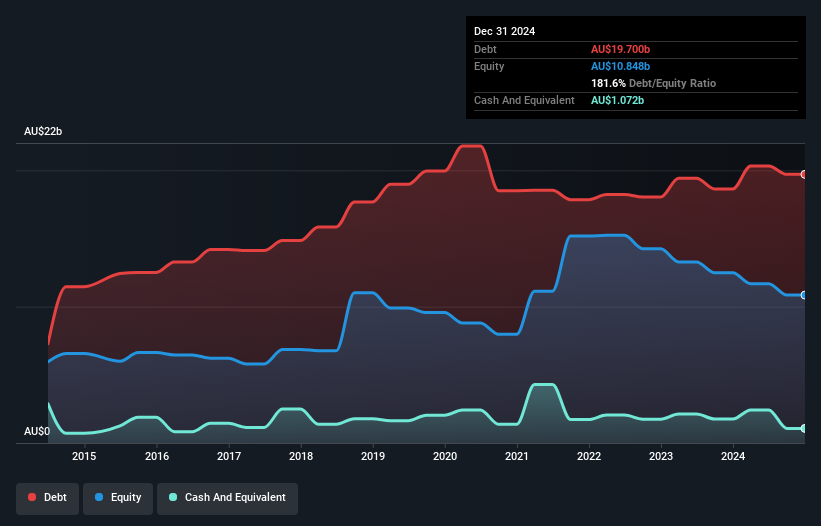
Legendary fund manager Li Lu (who Charlie Munger backed) once said, 'The biggest investment risk is not the volatility of prices, but whether you will suffer a permanent loss of capital.' When we think about how risky a company is, we always like to look at its use of debt, since debt overload can lead to ruin. As with many other companies Transurban Group (ASX:TCL) makes use of debt. But is this debt a concern to shareholders?
Our free stock report includes 3 warning signs investors should be aware of before investing in Transurban Group. Read for free now.When Is Debt Dangerous?
Debt is a tool to help businesses grow, but if a business is incapable of paying off its lenders, then it exists at their mercy. If things get really bad, the lenders can take control of the business. However, a more frequent (but still costly) occurrence is where a company must issue shares at bargain-basement prices, permanently diluting shareholders, just to shore up its balance sheet. Of course, debt can be an important tool in businesses, particularly capital heavy businesses. When we think about a company's use of debt, we first look at cash and debt together.
What Is Transurban Group's Net Debt?
You can click the graphic below for the historical numbers, but it shows that as of December 2024 Transurban Group had AU$19.7b of debt, an increase on AU$18.6b, over one year. However, it also had AU$1.07b in cash, and so its net debt is AU$18.6b.

A Look At Transurban Group's Liabilities
Zooming in on the latest balance sheet data, we can see that Transurban Group had liabilities of AU$3.91b due within 12 months and liabilities of AU$20.9b due beyond that. On the other hand, it had cash of AU$1.07b and AU$633.0m worth of receivables due within a year. So its liabilities outweigh the sum of its cash and (near-term) receivables by AU$23.1b.
This deficit isn't so bad because Transurban Group is worth a massive AU$44.1b, and thus could probably raise enough capital to shore up its balance sheet, if the need arose. But we definitely want to keep our eyes open to indications that its debt is bringing too much risk.
View our latest analysis for Transurban Group
In order to size up a company's debt relative to its earnings, we calculate its net debt divided by its earnings before interest, tax, depreciation, and amortization (EBITDA) and its earnings before interest and tax (EBIT) divided by its interest expense (its interest cover). Thus we consider debt relative to earnings both with and without depreciation and amortization expenses.
Transurban Group shareholders face the double whammy of a high net debt to EBITDA ratio (9.0), and fairly weak interest coverage, since EBIT is just 1.6 times the interest expense. This means we'd consider it to have a heavy debt load. More concerning, Transurban Group saw its EBIT drop by 8.5% in the last twelve months. If that earnings trend continues the company will face an uphill battle to pay off its debt. The balance sheet is clearly the area to focus on when you are analysing debt. But ultimately the future profitability of the business will decide if Transurban Group can strengthen its balance sheet over time. So if you want to see what the professionals think, you might find this free report on analyst profit forecasts to be interesting.
Finally, a company can only pay off debt with cold hard cash, not accounting profits. So it's worth checking how much of that EBIT is backed by free cash flow. Looking at the most recent three years, Transurban Group recorded free cash flow of 46% of its EBIT, which is weaker than we'd expect. That's not great, when it comes to paying down debt.
Our View
To be frank both Transurban Group's interest cover and its track record of managing its debt, based on its EBITDA, make us rather uncomfortable with its debt levels. Having said that, its ability to convert EBIT to free cash flow isn't such a worry. We should also note that Infrastructure industry companies like Transurban Group commonly do use debt without problems. Looking at the balance sheet and taking into account all these factors, we do believe that debt is making Transurban Group stock a bit risky. Some people like that sort of risk, but we're mindful of the potential pitfalls, so we'd probably prefer it carry less debt. The balance sheet is clearly the area to focus on when you are analysing debt. However, not all investment risk resides within the balance sheet - far from it. These risks can be hard to spot. Every company has them, and we've spotted 3 warning signs for Transurban Group (of which 2 are significant!) you should know about.
At the end of the day, it's often better to focus on companies that are free from net debt. You can access our special list of such companies (all with a track record of profit growth). It's free.
Valuation is complex, but we're here to simplify it.
Discover if Transurban Group might be undervalued or overvalued with our detailed analysis, featuring fair value estimates, potential risks, dividends, insider trades, and its financial condition.
Access Free AnalysisHave feedback on this article? Concerned about the content? Get in touch with us directly. Alternatively, email editorial-team (at) simplywallst.com.
This article by Simply Wall St is general in nature. We provide commentary based on historical data and analyst forecasts only using an unbiased methodology and our articles are not intended to be financial advice. It does not constitute a recommendation to buy or sell any stock, and does not take account of your objectives, or your financial situation. We aim to bring you long-term focused analysis driven by fundamental data. Note that our analysis may not factor in the latest price-sensitive company announcements or qualitative material. Simply Wall St has no position in any stocks mentioned.
About ASX:TCL
Transurban Group
Engages in the development, operation, management, and maintenance of toll road networks.
Moderate growth potential low.
Similar Companies
Market Insights
Community Narratives



